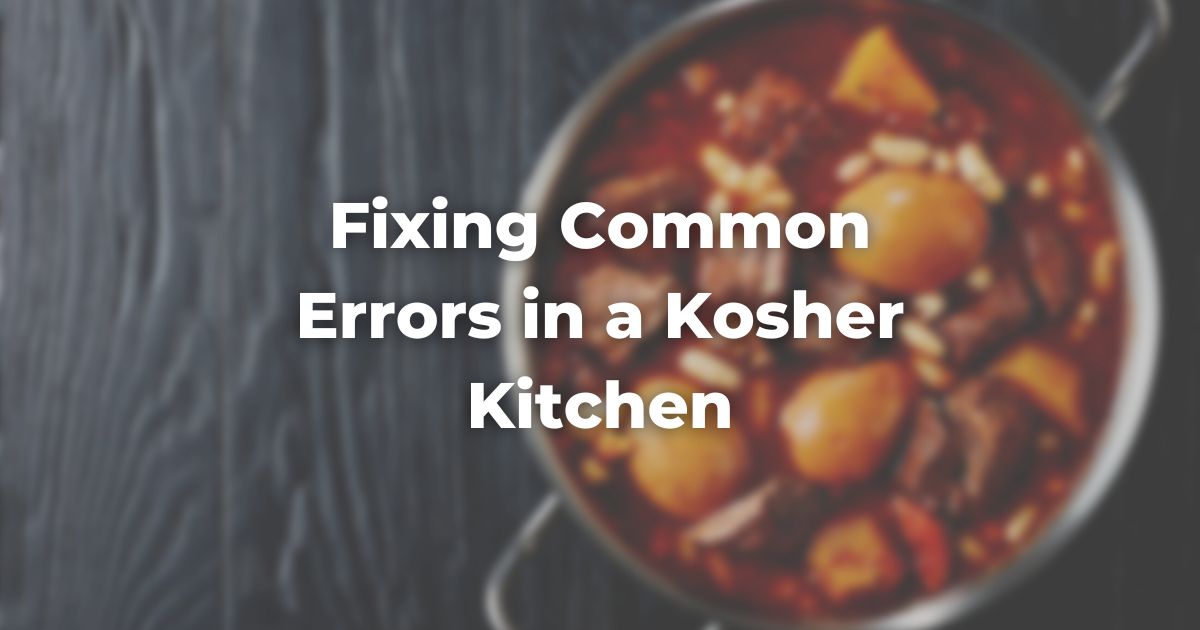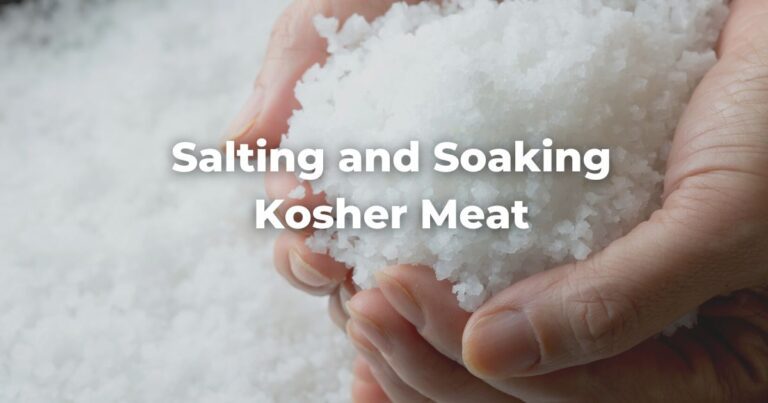No matter how careful one might be, mistakes will happen.
Most, fortunately, are easily corrected, and even those that cannot be dealt with simply can be corrected with a little more effort.
We should note that these corrective actions are after-the-fact remedies, in Hebrew b’di-avad (often spelled b’di-eved or bediavad, bedieved).
One should take care to avoid such situations, but can rest assured that, when accidents do happen, the majority can be dealt with easily. Of course, setting up the kitchen with storage areas clearly marked and working with only one kind of food at a time are the most effective ways to avoid mistakes.
What follows is a description of some typical mistakes and their corrective actions. In other cases, the best course of action will be to contact a rabbi for advice.
Dishes in the Wrong Place
If you have put clean dishes or utensils in the wrong cabinet or drawer, simply put them back in the right place.
Mixtures of Food
In terms of foodstuffs being mixed together inadvertently, the law distinguishes between mixtures of like and like, and mixtures of like and unlike.
A mixture of like substances, such as kosher and non-kosher beef, is called min b’mino. Identifying the single non-kosher piece of stew meat in a package of kosher stew meat would be impossible. For such a mixture to be considered usable, therefore, the meat must be reasonably dry and the majority of the meat mixed must be kosher.
A mixture of unlike substances, such as non-kosher meat that has fallen into a pot of vegetables, is called min b’she-eino mino and is significantly easier to deal with, as the offending item is far more easily removed and measured (Shulchan Arukh, Yoreh Deah 98).
The following rules presuppose these distinctions:
If dairy and meat foods were inadvertently mixed together, the laws are more complex.
If meat and dairy foods that were cold and dry come into contact, both remain kosher and usable. If the products were cold, but moist to the touch, then the point of contact must be rinsed. After doing so, however, both remain kosher and usable.
If bread comes in contact with a moist food, the bread may be used only with the same kind of food, be it meat or dairy (Shulchan Arukh, Yoreh Deah 91).
If a piece of meat should fall into a pot of milk, things become even more complicated. If both the meat and the liquid in the pot are cold, then the meat must be immediately removed and rinsed, but both remain kosher and usable.
If, however, both substances are hot, neither can be used and the pot itself must be kashered by boiling.
This is because generally there needs to be heat in order for taste transfer to occur rendering the mixture unkosher.
If only one of the two substances is hot, the principle of tata·a g’var—according to which food that falls on or is placed on top of another foodstuff acquires the temperature status of the lower food—applies as follows.
If the top one of the two was the hot substance (e.g., if a piece of hot meat were to fall into a bowl of cold milk), the meat must be removed, rinsed and its top layer pared off, whereupon it may be used, and the milk is permitted.
If the bottom of the two was hot (e.g., if cold meat were to fall into a bowl of warm milk), neither can be used and the pot must be kashered by boiling. However, if the volume of the milk was at least sixty times the volume of the meat, the procedure outlined above may be used even if the milk was hot and the meat cold (Shulchan Arukh, Yoreh Deah 91).
If a drop of milk were to fall onto a piece of meat cooking in a pot, the rules are as follows.
If the piece of meat was on the surface and the pot had not been stirred since the accident, then the meat is permitted if the volume of the piece of meat was sixty times greater than the volume of the milk which fell on it.
If the meat was on the surface and the pot had been stirred since the accident, then the contents of the pot are kosher only if the volume of the contents of the pot is at least sixty times the volume of the piece of meat on which the milk fell.
If the volume of the pot is less than sixty times the volume of the meat, the contents may not be used and the pot itself must be kashered by boiling.
If the piece of meat on which the milk fell was partially or fully submerged, the rule of bateil b’shishim (i.e., the annulment of a forbidden or unwanted substance by a licit or desired substance sixty times its volume, also spelled batel beshishim) applies in such a way that the volume of the entire contents of the pot is measured against the milk (Shulchan Arukh, Yoreh Deah 92).
Using the Wrong Utensil or Dish
If one inadvertently uses a utensil for the wrong type of food, the following rules apply.
Even if the contents of the pot are hot and the utensil itself had been used within the previous twenty-four hours, the food may still be used if the volume of the pot is sixty times the volume of the surface area of the immersed utensil.
If the volume of the contents of the pot is less than sixty times the volume of the area of the utensil immersed, the contents may not be used and the utensil itself, if made of metal, must be kashered by boiling.
If the utensil is made of wood, it cannot be kashered and may not be used.
Utensils that have not been used for twenty-four hours or more may be kashered by boiling. If the utensil is made of heat-resistant plastic, extra care must be taken to scrub it perfectly clean before boiling.
If one inadvertently uses the wrong dishes or pot for cooking, the law is as follows.
If the pot had been used within the previous twenty-four hours, then the food is prohibited and the pot itself must be kashered. If, however, the pot had not been used within the previous twenty-four hours, the food is permitted, but the pot still requires kashering (Shulchan Arukh, Yoreh Deah 93:1).
If one inadvertently used a dairy knife to cut hot meat, then the law is as follows.
If the knife had been used within twenty-four hours, it must be kashered. If the volume of the meat is at least sixty times the volume of the portion of the knife which touched the meat, then the meat may be used. If less than sixty times the volume, however, it is prohibited.
If the knife had not been used within the previous twenty-four hours, the knife must still be kashered, but the meat may be used after paring off the layer of meat the knife touched (Shulchan Arukh, Yoreh Deah 94:7).
Cooking Without Heat
The law considers pickling with vinegar-based marinades to be akin to cooking (heat).
Therefore, if one inadvertently soaks or pickles kosher and non-kosher foods together, the volume of the kosher food must be more than sixty times that of the prohibited food for the resultant mixture to be permitted for consumption once the non-kosher foodstuffs have been removed (Shulchan Arukh, Yoreh Deah 105:1).
If the volume is less than sixty times, then the entire mixture is not kosher and must be discarded. The principle that the prolonged soaking of a food in liquid is considered akin to cooking is called kavush ki-m’vushal. In any event, care must be taken to marinate only meats that have been soaked and salted and to use meat utensils.
There is one important caveat to all the rules mentioned above: one is not permitted to create a prohibited mixture on purpose, even if the proportion of non-kosher to kosher foods will be less, even far less, than the crucial 1:60 ratio.
An accidental mixture can be corrected, but a deliberate manipulation of the 1:60 annulment rule to circumvent prohibitions cannot be corrected. Also, any portion or piece of food cooked and ready to serve (called ḥatikhah ha-re’uyah l’hitkabbeid) cannot be annulled by the 1:60 rule (Shulchan Arukh, Yoreh Deah 101).
The concept of n’tinat ta·am li-f’gam (literally “imparting a bad taste,” also called notein ta’am lifgam) is relevant here. If a bad-tasting forbidden substance (something rancid, for example) falls into permitted food, the food remains permitted regardless of the ratio of the forbidden substance to the permitted (Shulchan Arukh, Yoreh Deah 103:1).
Even if the food that fell is not bad-tasting by itself, but is so in combination with the food into which it has fallen, the combination also remains permitted (Shulchan Arukh, Yoreh Deah 103:1). A utensil left unused for twenty-four hours is considered to impart a bad taste no matter what.
The most practical application of the principle of imparting a bad taste is the accidental washing of dirty meat and dairy dishes together in a sink filled with soapy water (which does not taste good). In this case, the dishes remain kosher after a thorough rinse.
Recognizable Flavors
Finally, the principle of ta·am ke’ikkar (meaning “the flavor is the same as the substance”) must also be mentioned.
If a piece of forbidden food falls onto permitted food or into a pot of permitted food, and still imparts a recognizable flavor even though subsequently removed, it is considered as if the forbidden food itself were still present (BT Chullin 108a, and see Rashi on Chullin 108a:3 s.v. amar abbayei ta·amo v’lo mamasho be’alma de’oraita). Therefore, if a piece of highly seasoned sausage fell on cold pizza, the flavor imparted by it on the pizza would render the pizza non-kosher.
Adapted with permission from The Observant Life.
Authors
-

Rabbi Paul S. Drazen (1951-2018) spent two-thirds of his rabbinic career serving individual congregations and one-third on the staff of USCJ, all the while creating programs and educational opportunities to make Jewish observance and practice clear, accessible, and attainable for everyone.
View all posts -



The Observant Life: The Wisdom of Conservative Judaism for Contemporary Jews distills a century of thoughtful inquiry into the most profound of all Jewish questions: how to suffuse life with timeless values, how to remain loyal to the covenant that binds the Jewish people and the God of Israel, and how to embrace the law while retaining an abiding sense of fidelity to one’s own moral path in life. Written in a multiplicity of voices inspired by a common vision, the authors of The Observant Life explain what it means in the ultimate sense to live a Jewish life, and to live it honestly, morally, and purposefully. The work is a comprehensive guide to life in the 21st Century. Chapters on Jewish rituals including prayer, holiday, life cycle events and Jewish ethics such as citizenship, slander, taxes, wills, the courts, the work place and so much more.
View all posts






